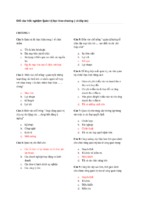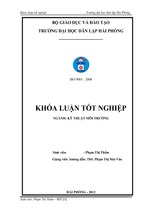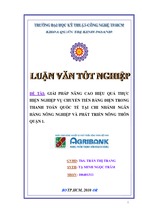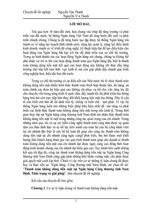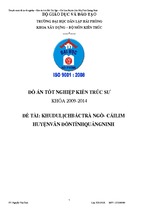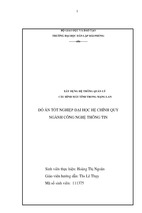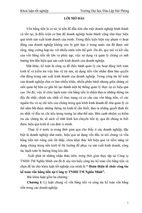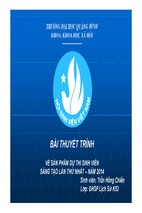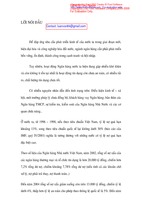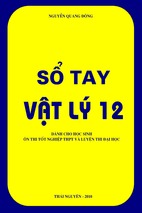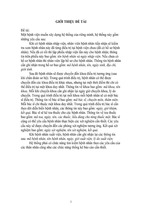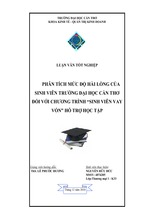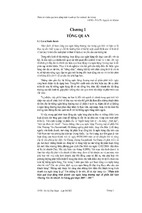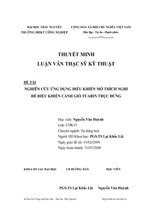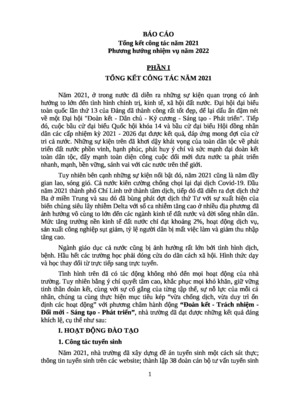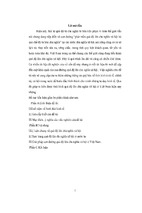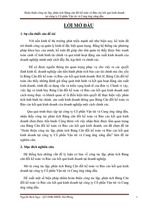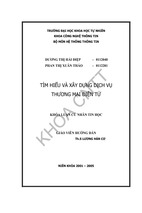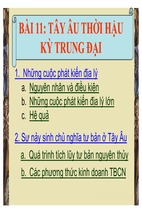TENSES
(CÁC THÌ)
I. Thì hiện tại đơn (Simple Present)
Cách dùng chính
- Một thói quen, một hành động được lặp đi lặp lại thường xuyên. Trong câu thường có
các trạng từ: always, often, usually, sometimes, seldom, every day/week/month…
Ex: Mary often gets up early in the morning.
- Một sự thật lúc nào cũng đúng, một chân lý.
Ex: The sun rises in the east and sets in the west.
- Một hành động trong tương lai đã được đưa vào chương trình, kế hoạch. Các động
từ thường dùng: open, close. begin, end, start, finish, arrive, leave, come, return.
Ex: The last train leaves at 4.45.
II. Thì hiện tại tiếp diễn (Present Continuous)
Cách dùng chính
- Một hành động hay sự việc đang diễn ra ở hiện tại (trong lúc nói), trong câu thường
có các trạng từ: now, right now, at the moment, at present, …
Ex: It’s raining at the moment.
- Dùng trong câu đề nghị, câu mệnh lệnh như look!, listen!, be quite!, …
Listen! She’s playing the piano.
- Một hành động đã được lên kế hoạch thực hiện trong tương lai gần.
Ex: I am going to the cinema with my father tonight.
- Một hành động nhất thời kéo dài không lâu thường dùng với: today, this week/month,
these days.
Trang 1
Ex: I usually ride to school, but I am going to school by bus this
week.
Những động từ không được dùng ở thì HTTD
- Động từ chỉ giác quan: hear, see, smell, taste.
- Động từ chỉ tình cảm, cảm xúc: love, hate, like, dislike, want, wish.
- Động từ chỉ trạng thái, sự liên hệ, sở hữu: look, seem, appear, have, own, belong to,
need...
- Động từ chỉ sinh hoạt, trí tuệ: agree, understand, remember, know, …
III. Thì hiện tại hoàn thành (Present Perfect)
Cách dùng chính
- Một hành động xảy ra trong quá khứ không xác định rõ thời điểm.
Ex: They have moved into a new apartment.
- Một hành động lặp đi lặp lại nhiều lần cho đến thời điểm hiện tại.
Ex: I have watched “Iron man” several times.
- Một hành động xảy ra trong quá khứ và kéo dài đến hiện tại.
Ex: My friend has lived in HCMC since 1998.
- Một hành động xảy ra trong quá khứ và có kết quả ở hiện tại.
Ex: He has broken his leg, so he can’t play tennis.
- Trong cấu trúc:
Be + the first/second…time + S + have/has + V3/ed
Be + the so sánh nhất + N + S + have/has + ever + V3/ed
Ex: This is the first time I have been to Paris.
She is the most honest person I have ever met.
Các trạng từ thường dùng với thì HTHT:
Trang 2
- just (vừa mới), recently/ lately (gần đây), ever (đã từng), never…before (chưa bao
giờ), yet (chưa xảy ra), already (xảy ra rồi)
- since (từ khi), for (khoảng, trong)
- so far = until now = up to now = up to the present (cho đến bây giờ).
- In/Over/During/For + the + past/last + time (trong thời gian qua).
IV. Thì hiện tại hoàn thành tiếp diễn (Present Perfect Cont.)
Cách dùng chính
- Hành động bắt đầu trong quá khứ và kéo dài LIÊN TỤC đến hiện tại và còn tiếp diễn
đến tương lai, thường dùng với how long, since và for.
Ex:
How long have you been waiting for her?
I have been waiting for her for an hour.
* Các dấu hiệu nhận biết khác: all day, all my lifetime, all day long, all the morning
Ex:
It has been raining all day.
V. Quá khứ đơn (Simple Past)
Cách dùng chính
- Diễn tả hành động đã xảy ra và hoàn tất trong quá khứ với thời gian được xác định
rõ. Các trạng từ thường được đi kèm: yesterday, ago, last week/month/year, in the past,
in 1990, …
Ex:
Uncle Ho passed away in 1969.
VI. Quá khứ tiếp diễn (Past Continuous)
Cách dùng chính
- Một hành động xảy ra ở một thời điểm trong quá khứ.
Ex:
She was studying her lesson at 7 last night.
- Một hành động kéo dài một khoảng thời gian trong quá khứ.
Trang 3
Ex:
I was practising English from 3pm to 6pm yesterday.
- Một hành động đang xảy ra (QKTD) ở quá khứ thì có một hành động khác xen vào
(QKĐ).
Ex:
He was sleeping when I came.
While my mother was cooking dinner, the phone rang.
- Hai hành động diễn ra song song cùng lúc trong quá khứ.
Ex:
While I was doing my homework, my younger brother was
playing video games.
VII. Quá khứ hoàn thành (Past Perfect)
Cách dùng chính
- Một hành động đã xảy ra và hoàn tất trước một thời điểm hoặc một hành động khác
trong quá khứ (hành động trước dùng QKHT, hành động sau dùng QKĐ).
Ex:
We had had dinner before 8 o’clock last night.
Lucie had learned English before she came to England.
- Một hành động đã xảy ra nhưng chưa hoàn thành, tính đến một thời điểm nào đó
trong quá khứ.
Ex:
By the time I left that school, I had taught there for ten
years.
VII. Quá khứ hoàn thành tiếp diễn (Past Perfect Cont.)
Cách dùng chính
- Dùng để nhấn mạnh tính LIÊN TỤC của một hành động cho đến khi một hành động
khác xảy ra trong quá khứ.
Ex:
When she arrived, I had been waiting for three hours.
VIII. Tương lai đơn (Simple Future)
Cách dùng chính
Trang 4
- Diễn tả một hành động sẽ xảy ra trong tương lai.
Ex:
I will call you tomorrow.
- Một quyết định đưa ra vào lúc nói.
Ex:
It’s cold. I’ll shut the window.
- Một quyết tâm, lời hứa, đề nghị, yêu cầu.
Ex:
I will lend you the money.
Will you marry me?
- Một tiên đoán, dự báo trong tương lai.
Ex:
People will travel to Mars one day.
Một số trạng từ chỉ thời gian thường gặp:
- tomorrow, tonight, next week/month/year, some day, in the future, soon, …
Cách dùng BE GOING TO
- Diễn tả ý định (không có trong kế hoạch).
Ex:
I have saved some money. I am going to buy a new computer.
- Diễn tả một dự đoán có căn cứ.
Ex:
Look at those clouds. It’s going to rain.
IX. Tương lai tiếp diễn (Future Continuous)
Cách dùng chính
- Một hành động sẽ đang diễn ra ở một thời điểm trong tương lai.
Ex:
This time next week I will be playing tennis.
- Một hành động sẽ đang diễn ra ở một thời gian trong tương lai.
Ex:
We’ll be working hard all day tomorrow.
Trang 5
X. Tương lai hoàn thành (Future Perfect)
Cách dùng chính
- Một hành động sẽ hoàn tất trước một thời điểm trong tương lai.
Ex:
It’s now 7pm. I will have finished teaching this class by 8.30.
- Một hành động sẽ hoàn tất trước một hành động khác trong tương lai.
Ex:
By the time you come back, I will have written this letter.
* Thì này thường được bắt đầu bằng By + time (By then, By the time, By the end of
this week/month/year).
XI. Tương lai hoàn thành tiếp diễn (Future Perfect Cont.)
Cách dùng chính
- Một hành động bắt đầu từ quá khứ và kéo dài LIÊN TỤC đến một thời điểm nào đó
hoặc một hành động nào đó trong tương lai.
Ex:
By November, we’ll have been living in this house for 10 years.
When George gets his degree, he will have been studying at
Oxford for 4 years.
Trang 6
VOICES
(CÁC THỂ THỤ ĐỘNG)
I. Các bước đổi câu chủ động sang câu bị động
1. Xác định S, V, O trong câu chủ động
2. Xác định thì của động từ
3. Đem O trong câu chủ động làm S trong câu bị động, đem S trong câu chủ
động làm O trong câu bị động.
4. Lấy V chính trong câu chủ động đổi thành P.P rồi thêm BE thích hợp trước
P.P.
5. Đặt BY trước O trong câu bị động.
II. Động từ trong câu chủ động và bị động
1. Simple Tense
Ex:
(A) Lan cleans the floor every morning.
(P) The floor is cleaned by Lan every morning.
2. Simple Past
Ex:
(A) Nam broke the glasses.
(P) The glasses were broken by Nam.
3. Simple Future
Ex:
(A) Mr Brown will not teach our class.
(P) Our class will not be taught by Mr. Brown.
4. Present Continuous
Trang 7
Ex:
(A) The pupil is not doing some exercises.
(P) Some exercises are not being done by the pupil.
5. Past Continuous
Ex:
(A) Mother was cooking dinner at 6 yesterday.
(P) Dinner was being cooked by mother at 6 yesterday.
6. Present Perfect
Ex:
(A) The secretary has just finished the report.
(P) The report has just been finished by the secretary.
7. Past Perfect
Ex:
(A) The boy had found the key before 9 yesterday.
(P) The key had been found by the boy before 9 yesterday.
8. Future Perfect
Ex:
(A) The students will have written many compositions.
(P) Many compositions will have been written by the students.
9. Modal Verbs
Ex:
(A) The students must do this exercises in class.
(P) This exercises must be done in class by the students.
Ex:
(A) We ought to overcome these difficulties.
(P) These difficulties ought to be overcome.
III. Một số điểm cần lưu ý
1. Câu hỏi chủ động và bị động:
Ex:
(A) Did your father make this chair?
(P) Was this chair made by your father.
Ex:
(A) Who repaired your bicycle?
Trang 8
(P) By whom was your bicycle repaired?
Ex:
(A) What plays did Shakespeare write?
(P) What plays were written by Shakespeare?
2. Lược bỏ túc từ trong câu bị động:
Nếu chủ từ trong câu chủ động KHÔNG chỉ rõ là người hay vật cụ thể, rõ ràng
(people, someone, every one, no one, anyone, I, we, you, they, he, she, it) thì khi đổi sang
câu bị động (by people, by someone, by everyone, by no one, by anyone, by me, by us, by
you, by them, by him, by her, by it ) có thể được bỏ đi.
Ex:
(A) People built that bridge in 1998.
(P) That bridge was built in 1998.
3. Động từ có hai túc từ:
- Động từ cần giới từ TO: give, lend, send, show, …
Ex:
(A) John will give me this book. (=John will give this book to
me)
(P1) I will be given this book by John.
(P2) This book will be given to me by John.
- Động từ cần giới từ FOR: buy, make, get, …
Ex:
(A) He bought her a rose. (=He bought a rose for her.)
(P1) She was bought a rose.
(P2) A rose was bought for her.
4. Một số dạng bị động khác:
- Động từ chỉ ý kiến: They/ People say/ think/ believe/ suggest/ expect …that …
Ex:
(A) People say that Henry eats ten eggs a day.
(P1) It is said that Henry eats ten eggs a day.
(P2) Henry is said to eat ten eggs a day.
Ex:
(A) They thought that Mary had gone away.
(P1) It was thought that Mary had gone away.
Trang 9
(P2) Mary was thought to have gone away.
- Thể sai khiến: HAVE/ GET
Ex:
(A) I had him repair my car.
(P) I had my car repaired.
Ex:
(A) I get her to make some coffee.
(P) I get some coffee made.
- Động từ chỉ giác quan: see, watch, hear, look, taste
Ex:
(A) They saw her come in.
(P) She was seen to come in.
Ex:
(A) I get her to make some coffee.
(P) I get some coffee made.
- Câu mệnh lệnh
Ex:
(A) Write your name here.
(P) Let your name be written here.
Ex:
(A) He let me go out.
(P) I was let/ allowed to go out.
- Một số động từ đặc biệt: remember, want, try, like, hate, …
Ex:
(A) I remember them taking me to the zoo.
(P) I remember being taken to the zoo.
Ex:
(A) She wants her sister to take some photographs.
(P) She wants some photographs to be taken by her sister.
- Một số trường hợp đặc biệt nguyên mẫu có TO: suppose, see, make, …
Ex:
(P) You are supposed to learn English now.
(A1) It is your duty to learn English now.
(A2) You should learn English now.
Trang 10
Ex:
(A) His father makes him learn hard.
(P) He is made to learn hard.
SUBJECT-VERB
AGREEMENT
(CÁC THỂ THỤ ĐỘNG)
Trang 11
I. Những trường hợp động từ chia dạng số ít
1. Danh từ đếm được số ít hoặc không đếm được
Ex:
Mary lives in China.
Milk is my favorite drink.
2. Danh từ tận cùng bằng “s” mang nghĩa số ít
news, mathematics (maths), economics, linguistics, politics, statistics, physics,
phonetics, aerobics, athletics, gymnastics, measles, mumps, rickets, diabetes, the
Philippines, the United States, …
Ex:
The news is interesting.
3. Đại từ bất định: every/any/no/some + body/one/thing
Ex:
Someone is knocking at the door.
4. Mệnh đề bắt đầu bằng THAT/ WHAT/ WHERE/ WHEN … hoặc cụm từ bắt
đầu bằng TO V/ V-ing.
Ex:
That you get high marks does not surprise me.
To master English is not easy.
Growing flowers was her hobby when she was young.
5. Từ chỉ thời gian, khoảng cách, tiền bạc, đo lường, thể tích.
Ex:
Eight hours of sleep a day is enough.
Five kilometers is not a long distance.
Twenty dollars is too much to pay for that shuff.
6. Từ định lượng: each of/ one of/ ...
Ex:
Each of the children has a toy.
One of my friends is coming.
II. Những trường hợp động từ chia dạng số nhiều
Trang 12
1. Danh từ đếm được số nhiều
Ex:
Engineers are key figures in our life.
2. Các danh từ khác nhau kết hợp bằng AND
Ex:
Scientists and engineers are very important.
3. Từ định lượng most (of)/ some (of)
Ex:
Most of the students here work very hard.
Some books I read last week are written by a famous writer.
4. Danh từ luôn ở dạng số nhiều
people, police, cattle, poultry, military, goods, clothes, scissors, glasses,…
Ex:
The police have arrested the robbers.
Sun glasses are used to protect your eyes from the sunlight.
* Chú ý: A pair of scissors is helpful in this case.
5. The + Adj chỉ danh từ số nhiều
the rich/poor, the young/old/elderly, the homeless,
blind/deaf/mute, the English/Chinese/Vietnamese,…
Ex:
the
handicapped,
the
The poor have many problems.
III. Những trường hợp cần lưu ý
1. Khi các chủ từ được nối với nhau bởi as well as, along with hoặc together
with, động từ sẽ hòa hợp với chủ từ thứ nhất.
Ex:
The students, as well as their teacher, have not come yet.
The teacher, as well as his students, has not come yet.
2. Khi các chủ từ được nối với nhau bởi either…or, neither…or hoặc not
only…but also, động từ sẽ hòa hợp với chủ từ gần nhất.
Ex:
Neither she nor her friends have arrived.
Not only the dogs but also the cat is mine.
Trang 13
3. A number of/ The number of.
Ex:
A number of applicants have been interviewed.
The number of days in week is seven.
4. Chủ từ là danh từ tập hợp
family, class, crowd, group, club, association, company, team, …
- Xem như MỘT ĐƠN VỊ
Ex:
My family has three members.
- Đề cập đến TỪNG CÁ NHÂN
Ex:
My family were watching TV at 7 yesterday.
5. There is/ There are
Ex:
There is a storm approaching.
There were too many people at the party.
Chú ý: There is certain/ sure/ likely/ bound to be = chắc chắn là sẽ có
Ex:
There is sure to be trouble when she gets his letter.
Do you think there is likely to be snow.
REPORT SPEECH
(CÂU NÓI TRỰC TIẾP – GIÁN TIẾP)
Trang 14
I. Động từ tường thuật ở thì hiện tại hoặc tương lai
1. Đổi ngôi thứ NHẤT phù hợp với CHỦ TỪ trong mệnh đề chính
2. Đổi ngôi thứ HAI phù hợp với TÚC TỪ trong mệnh đề chính
3. Ngôi thứ BA không đổi.
Ex:
He says to me, “I and you will go with her father tomorrow.”
He tells me (that) he and I will go with her father tomorrow.
II. Động từ tường thuật ở thì quá khứ
1. Ngôi như trên
2. Thì của động từ
V
Preterite
Preterite
had + P.P
3. Trạng từ chỉ thời gian và nơi chốn
today
that day
tonight
that night
now
then
ago
before
yesterday
the day before
last week
the week before
next week
the week after
tomorrow
the day after
this
that
these
those
here
there
Trang 15
Ex:
She said to me, “I meet your brother yesterday.”
She told me that she had met my brother the day before.
III. Các dạng câu tường thuật
1. Câu khẳng định và phủ định
Động từ tường thuật thường là said/told.
Ex:
He said, “I have seen her today.”
He said (that) he had seen her that day.
Ex:
The teacher said to Peter, “The prize was not given to you.”
The teacher told Peter (that) the prize had not been giving to
him.
2. Câu hỏi
Động từ tường thuật thường là ask/ wondered/ wanted to know.
- Câu hỏi Yes-No
Ex:
She asked me, “Do you like him?”
She asked me if I liked him.
Ex:
He said, “Can you speak English, Nam?”
He asked Nam whether he could speak English.
- Câu hỏi WH-
Ex:
He said, “What is her name?”
He asked what her name was.
Ex:
She said to him, “Where do you live?”
She asked him where he lived.
3. Câu mệnh lệnh
Động từ tường thuật thường là told/ asked/ ordered.
- Khẳng định:
Trang 16
Ex:
The teacher said, “Go to the board, John”
The teacher told John to go to the board.
- Phủ định:
Ex:
Nam said to his friend, “Don’t shut the door”
Nam asked his friend not to shut the door.
4. Câu cảm thán
Động từ tường thuật thường là exclaim/ say that.
Ex:
“What a lovely garden they have!”
He exclaimed/ said that what a lovely garden they had.
“How hot it is!”
He exclaimed/ said that how hot it was.
IV. Một số dạng đặc biệt
1. Diễn tả lời khuyên
Một số mẫu câu thường gặp:
You + had better
You + should
Why don’t you…?
If I were you…
Động từ tường thuật thường là advised.
Ex:
My mother said: “You’d better go to school early.”
My mother advised me to go to school early.
Ex:
“Why don’t you go to school early?”, said my mother.
My mother advised me to go to school early.
Ex:
My friend said to me: “If I were you, I would met him.”
Trang 17
My friend advised me to meet him.
2. Diễn tả lời đề nghị
Một số mẫu câu thường gặp:
Let’s…
Why don’t we…
Shall we…
How about…
In my opinion, …
Động từ tường thuật thường là suggested.
Ex:
My friend said to me: “Let’s go out for a drink.”
My mother suggested going out for a drink.
Ex:
My friend said to me: “Why don’t we go out for a drink?”
My mother suggested going out for a drink.
3. Diễn tả lời mời
Một số mẫu câu thường gặp:
Would you like…?
Động từ tường thuật thường là invited.
Ex:
“Would you like to come to my party?”
He invited me to come to his party.
CÂU ĐIỀU KIỆN
CÂU AO ƯỚC
(CÂU NÓI TRỰC TIẾP – GIÁN TIẾP)
I. CÂU ĐIỀU KIỆN
Trang 18
1. Câu điều kiện loại 1
Diễn tả điều kiện CÓ THỂ XẢY RA ở hiện tại hoặc tương lai.
Ex:
If it rains heavily, I will stay at home.
2. Câu điều kiện loại 2
Diễn tả điều kiện KHÔNG THỂ XẢY RA ở hiện tại hoặc tương lai.
Ex:
I would buy a new bicycle if I had enough money.
If I were a king, you would be a queen.
3. Câu điều kiện loại 3
Diễn tả điều kiện KHÔNG THỂ XẢY RA ở quá khứ.
Ex:
If John had worked harder, he wouldn’t have failed his exam.
4. If not = Unless (trừ phi)
Ex:
We will be late if we don’t hurry
We will be late unless we hurry.
Ex:
If I have time, I’ll help you
Unless I have time, I won’t help you.
5. But for + noun + điều kiện loại 2,3 (nếu không có)
Ex:
You help me everyday so I can finish my work.
But for your daily help, I couldn’t finish my work.
6. Một số từ/ cụm từ có thể thay cho IF với nghĩa tương đương
provided that/ so (as) long as (miễn là)/ in case (trong trường hợp)/ on condition that
(với điều kiện).
Ex:
You can borrow my book provided that you bring it back.
II. CÂU AO ƯỚC: WISH/ IF ONLY
1. Không có thật ở hiện tại: Preterit
Trang 19
Ex:
I wish Peter were here now.
If only I had more money.
2. Không có thật ở tương lai: Would + V
Ex:
She wishes Tom would be here tomorrow.
If only Tom would be here tomorrow.
3. Không có thật ở quá khứ: HAD + P.P
Ex:
We wish she had passed her exam last year.
If only you hadn’t told Peter about our plan.
DETERMINES
(TỪ ĐỊNH LƯỢNG)
I. Từ chỉ số lượng lớn / nhỏ
Trang 20
- Xem thêm -

